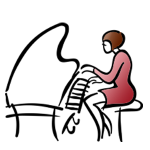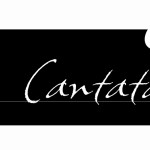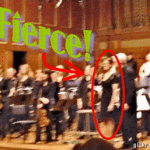Note: Thanks to the generosity of many friends, I am 20% of the way to my goal for my California trip, after just a couple of days! Can you help me get the rest of the way? 🙂
In a field like classical music, which places so much emphasis on preserving its traditions and maintaining the stored up riches of an established repertoire that is performed repeatedly, year after year, it’s easy to get jaded. When I browse concert listings for symphonies and other venerable musical organizations, I tend to transmogrify into a toxic hybrid of the heckling curmudgeons Statler and Waldorf from The Muppet Show, and Miranda Priestly, the imperious fashion editor portrayed by Meryl Streep in The Devil Wears Prada. “Sigh… Not another Beethoven symphony… That concerto again? Yawn. Well, I’ve never heard of that composer — how good could she be? And where on earth is my cappuccino? I ordered it at least five minutes ago!”
But then I actually drag my curvy white carcass to a concert, and nine times out of ten my cynicism and ennui evaporate, and I revel in that giddy, kid-in-a-candy-store feeling I get in the presence of this wonderful art form that so enriches my life (if not my wallet!).
it’s nice to know that I can still have my world rocked and my assumptions and expectations blown out of the water. It happened again Friday night.
I was really looking forward to this performance by the Cantata Singers, especially in light of the great conversations I had in recent weeks with Executive Director Jeffry George (in two parts, here and here) and Music Director David Hoose (here).
But to tell you the truth, I wasn’t sure I was really going to dig the music of Heinrich Schütz as much as I would something from a later period. I’m a hard-core romantic; early baroque music doesn’t necessarily make me jump up and down. I felt lukewarm about the Duruflé Requiem as well; I’m a bit of a requiem connoisseur, but there are other examples that I’m more enthusiastic about, like those by Verdi and Britten.
Well. Silly me.
The two Schütz pieces were a revelation. The rhythmic fluidity, expressivity and sensitivity to the text just dazzled me. There were moments in the first piece, So fahr ich hin zu Jesu Christ, when I thought to myself, “If I didn’t know who the composer was, I might guess Brahms.” And the multi-movement setting of Psalm 116 was dramatic and compelling at every moment.
The two motets by John Harbison were a bit spikier than other pieces I’ve heard by him, but nevertheless didn’t seem out of place. We Do Not Live to Ourselves employed an undulating chromatic phrase reminiscent of the BACH motif— I’ll have to ask him if it was something like that! My Little Children, Let Us Not Love in Word had a surprisingly jazz-like rhythm — surprising because it’s not what I would have expected out of the text, but I liked it.
I have a whole new appreciation for the Duruflé Requiem after this performance. The piece is gentler and more understated than other requiem settings, so it doesn’t hog the spotlight. There’s nary a hint of fire and brimstone in the piece, even at the Dies irae portion, which has inspired so many other composers to go all heavy metal (in the classical sense, of course 😉 ) The “Kyrie” (“Lord, have mercy) doesn’t so much beg for mercy as bask in the assurance of it. That’s not to say the piece is bland, however; on the contrary, it’s luscious. I especially enjoyed the solo by cellist Beth Pearson in the “Pie Jesu” movement.
I think both the venue and the size of the group — both in the medium range — were well-suited to making this piece shine, in its medium-scale version for organ and string orchestra.
The next performance by Cantata Singers will be March 12, and I heartily recommend checking it out if you’re in the area. Tell ’em Miss Music Nerd sent you! 🙂







Yay, Schütz!
You’ll probably love his Musikalische Exequien, Motets and Concertos with John Eliot Gardiner on DG Archiv 423 405.
– Paul
Yes, that sounds like a good one! 🙂
It’s a requiem – you’ll like it!
Schütz is one of my all time favorites–and this coming from a 20th-c Americanist! 🙂
Pingback: Not With A Bang, But A Hymn: Cantata Singers Presents Songs of Ralph Vaughan Williams « Miss Music Nerd